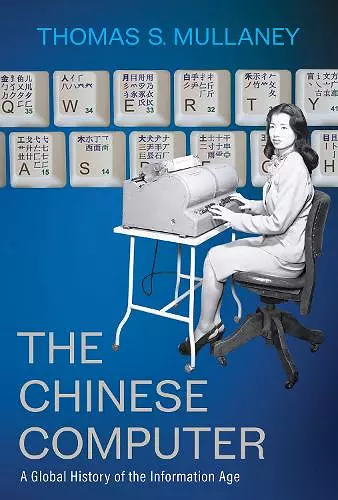The Chinese Computer
A Global History of the Information Age
Format:Hardback
Publisher:MIT Press Ltd
Published:28th May '24
Should be back in stock very soon

The fascinating, untold story of how the Chinese language overcame unparalleled challenges and revolutionized the world of computing.
A standard QWERTY keyboard has a few dozen keys. How can Chinese—a language with tens of thousands of characters and no alphabet—be input on such a device? In The Chinese Computer, Thomas S. Mullaney sets out to resolve this paradox, and in doing so, discovers that the key to this seemingly impossible riddle has given rise to a new epoch in the history of writing—a form of writing he calls “hypography.” Based on fifteen years of research, this pathbreaking history of the Chinese language charts the beginnings of electronic Chinese technology in the wake of World War II up through to its many iterations in the present day.
Mullaney takes the reader back through the history and evolution of Chinese language computing technology, showing the development of electronic Chinese input methods—software programs that enable Chinese characters to be produced using alphanumeric symbols—and the profound impact they have had on the way Chinese is written. Along the way, Mullaney introduces a cast of brilliant and eccentric personalities drawn from the ranks of IBM, MIT, the CIA, the Pentagon, the Taiwanese military, and the highest rungs of mainland Chinese establishment, to name a few, and the unexpected roles they played in developing Chinese language computing. Finally, he shows how China and the non-Western world—because of the hypographic technologies they had to invent in order to join the personal computing revolution—“saved” the Western computer from its deep biases, enabling it to achieve a meaningful presence in markets outside of the Americas and Europe.
An eminently engaging and artfully told history, The Chinese Computer is a must-read for anyone interested in how culture informs computing and how computing, in turn, shapes culture.
“Mullaney has written an informative and enjoyable history. . . . Whoever thought that a book about ‘hypographic semiotics’ could be so absorbing? Geeks will enjoy the computing conundrums and Sinophiles will love the history; laymen, too, will learn plenty.”
—The Economist
“Mullaney’s careful documenting of the typing machines of the last century. . . . reveals a story that’s tumultuous and chaotic. . . . An endless unfurling of something always in the process of becoming a fuller version of itself.”
—MIT Technology Review
“Mullaney's spirited narrative, half detective story, half history of technology, is a sequel to his equally fascinating book on the invention of the Chinese typewriter.”
—Foreign Affairs
“Mullaney’s telling of the unfamiliar history of how China’s computing developed . . . is mind-boggling. . . . [A] pioneering book.”
—Nature
"There’s no shortage of books out there on China, but Thomas Mullaney’s The Chinese Computer: A Global History of the Information Age really is something different. . . . A superbly-researched and original tale."
—Engelsberg Ideas
"Thick with technical details, but Mullaney’s judicious use of illustrations, charts and anecdotes makes this a thrill for anyone interested in the past—and future—of language and technology."
—China Books Review
“Tells a fascinating story.”
—Centre for International Governance Innovation
“At a time when Chinese quantum computers and Chinese AI systems and Chinese electric vehicles absorb all headline buzz and pundit bloviation, Professor Thomas S. Mullaney’s text draws our attention to a humbler and arguably more important technology: the Chinese input method editor (IME). . . . This is essential reading.”
—ChinAI
"The Chinese Typewriter and The Chinese Computer are two of the best books I’ve read in a very long time. And they’re not just good and interesting, but important to read, for the history they tell and the ideas and arguments they present—I can’t recommend them and Professor Mullaney’s other work enough."
—The Gradient
ISBN: 9780262047517
Dimensions: unknown
Weight: unknown
376 pages